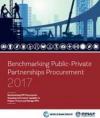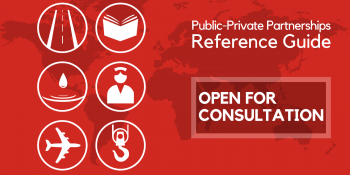The draft updated Report on Recommended Public-Private Partnership (PPP) Contractual Provisions is open for public consultation
The draft updated Report on Recommended Public-Private Partnership (PPP) Contractual Provisions is open for public consultation to capture inputs and recommen
PPP Toolkit for Improving PPP Decision-Making Process
Online resource published by the Government of India (Ministry of Finance) that has been designed to help improve decision-making for infrastructure PPPs in India and to improve the quality of the PPPs that are developed. The toolkit covers five infrastructure sectors (state highways, water and sanitation, ports, solid waste management, urban transport (bus rapid transport systems). It includes a case study of the Amritsar Inter-city Bus Terminal, Punjab, DBFOT basis.
Related Information:
PPP Reference Guide 3.0 (Full version)
A substantial body of knowledge on Public-Private Partnerships (PPPs) has been generated across the world by a broad spectrum of practitioners from government, the private sector, international development institutions, academia, and expert advisors. This Reference Guide helps readers navigate this body of knowledge. It introduces key topics on PPP, sets out options, and directs readers to examples and references where they can learn more.
Asignación de riesgo en contratos de Asociación Público-Privada (PPP Risk Allocation Tool)
El GI Hub ha contratado a Norton Rose Fulbright, una firma global de abogados, para preparar un informe sobre la Asignación de Riesgo en Contratos de Asociación Público-Privados (APP), versión 2016 (el Informe), con matrices que muestran la asignación de riesgo entre los sectores público y privado en transacciones APP típicas, conjuntamente con información relacionada sobre medidas de mitigación y arreglos característicos de soporte gubernamental. Se desarrollaron matrices separadas para 12 tipos designados de proyectos en los sectores de transporte, energía y agua y saneamiento.
政府和社会资本合作风险分配(Allocating Risks in Public-Private Partnerships)
作为“领先实践”工作的一部分,GIH与Norton Rose Fulbright(一家全球律师事务所)合作编制政府和社会资本合作(PPP)合同风险分配报告(2016版),报告所述矩阵展示了典型PPP交易中政府和社会资本之间的风险分配以及缓解措施,以及典型的政府支持安排,并且专门为运输、能源及供水与卫生行业的12个特定项目类型编制了独立矩阵。
政府和社会资本合作的风险分配项目反应理论工具
全球基础建设中心(GI Hub),总部位于澳大利亚悉尼市,是由二十国集团成立、负责制订全球投资发展战略的组织机构。全球基础设施中心主要使命之一是将“先进经验”应用于高质量的基础设施投资活动中,包括项目鉴定、文件编制以及材料采购的指导文书的编制及出版发行。
根据这一主要使命,全球基础设施中心在诸多领域为政府和社会资本合作(PPP)交易确立了带有注释的风险分配矩阵。风险分配是每一PPP交易的要素,只有对其有了充分的理解才能制订好每一个PPP协议。风险分配原则将被用于确定某一PPP协议是否“具有银行可融资性”(融资能力)以及是否具有长效性(即在长期合同终止前保持其效力)。
全球基础设施中心委托国际化法律事务所,诺顿罗氏集团,编制一份有关2016年版《政府和社会资本合作(PPP)合同中风险分配》的报告。报告中的矩阵表征了典型PPP交易中国营部门及私营部门之间的风险分配。同时,报告中还给出了缓解措施以及典型的政府支持性协议。报告针对交通、能源、水利以及卫生部门的项目设计了12种不同矩阵。
Joint Venture/ Joint Stock Company Checklist
There is increased use of them between public utilities and private parties, often in combination with or following the corporatization of a public utility.
(April 2008)

